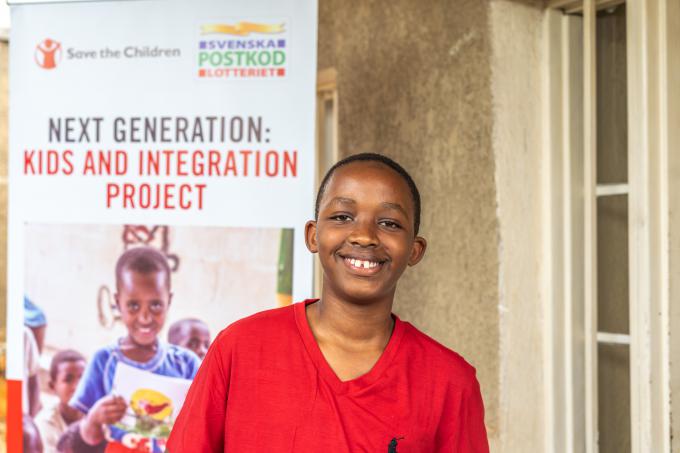Life is Good When Every Child Is Happy: Ishimwe's Story

In 2015, a wave of civil unrest caused thousands of Burundian men, women and children to flee to Rwanda and bordering countries. Since then, Burundian refugees, including unaccompanied and separated children (UASC) as well as other children with special needs, have sought peace and stability in Rwanda.
Fearing for the lives of his children, a father of eight sent his family to Rwanda alone with a promise of joining them later. Ishimwe, 13, settled in Kigali with his siblings who range from age 9 to 26. Although safe, threats to the young family’s survival persisted.
Without their father, who was unable to reunite with his sons and daughters, the school-age children had to provide for themselves. The older brothers looked for work to support their siblings. Living conditions were poor even after initially moving in with a caregiver.
The children now all living together in Kigali where the older siblings take care of their younger brothers and sisters. Although they earn an income from part-time jobs, their resources are limited.
“Our life without my daddy has not been easy but through Save the Children support and home visits with PSS and trainings, I am now getting to know that I have a bright future because before I always thought that life will never be better for me. I am going to school and attend all my classes and pass well,” confessed Ishimwe.
Resiliency was an underdeveloped competency until the siblings became involved with the Next Generation: Kids and Integration project. The project is made successful with the collaboration of the Ministry of Emergency Management and UNHCR with financial support from Svenska Postkod Lotteriet.
The overall goal of the project was to see Burundian refugees in Kigali and Huye, three reception centers and Mahama Camp live in dignity free from any form of violence and health threats.
Save the Children delivered psychosocial support (PSS), positive parenting trainings and material assistance to strengthen the young family.
In addition to the trainings and food provision, Save the Children advocated for livelihood security to ensure Ishimwe’s older brother and primary caregiver, Christian, 24, had consistent employment.
During these difficult times with the ongoing COVID-19 pandemic, some Rwandan families have lost their jobs and children are vulnerable to the economic fallout. For refugee families, especially those living in urban areas, COVID-19 has had a negative impact, which has made it difficult for them to afford food, clothes, school materials and school fees.
“Save the Children has been supporting us by giving us clothes and talking to us as well as giving us school materials,” confirmed Ishimwe.
Refugees, especially UASC and children from impoverished families, find it difficult to cope with their situation in the pandemic. These children need someone to actively listen and support them to build resilience.
Through Next Generation: Kids and Integration interventions, the young family has gained the life skills needed to reach their full potential, they can now express their needs and face challenges with a solution-oriented mindset.
“Save the Children has done a lot for us. I don’t even know how to say it, but they have been a great support for us in tough times. They helped my younger siblings access their education and whenever we asked for something, we were heard and supported,” exclaimed Christian.
 Rwanda
Rwanda